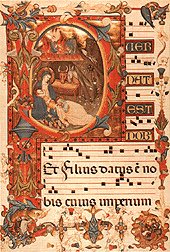A Benedictine Gift
 The Benedictine monks who arranged the O Antiphons built a hidden, yet delightful, little present into the collection for you to unwrap. You see, the seven messianic titles we have been praying with the past week contain a special message for all. Below are listed the titles in their original languages (Latin or Hebrew), which were compiled and placed into the Liturgy of the Hours (breviary). I have also shown the English counterparts and the dates for each title for clarity.
The Benedictine monks who arranged the O Antiphons built a hidden, yet delightful, little present into the collection for you to unwrap. You see, the seven messianic titles we have been praying with the past week contain a special message for all. Below are listed the titles in their original languages (Latin or Hebrew), which were compiled and placed into the Liturgy of the Hours (breviary). I have also shown the English counterparts and the dates for each title for clarity.(shown at right is an example of a Benedictine illumination - notice the Nativity detail and Gregorian notation)
Sapientia - (Wisdom) - Dec 17th
Adonai - (LORD) - Dec 18th
Radix Jesse - (Stump of Jesse) - Dec 19th
Clavis David - (Key of David) - Dec 20th
Oriens - (Radiant Dawn) - Dec 21st
Rex Gentium - (King of Nations) - Dec 22nd
Emmanuel - (God with us) - Dec 23rd
To unwrap your gift, take the first letter of each title and arrange them in reverse order to get EROCRAS – “ero cras” is a Latin phrase that translates "tomorrow, I will come." And indeed He will come tomorrow. To enjoy your gift, go to Mass and receive the Body and Blood of the One born in Bethlehem, the city of David.
Merry Christmas to you all!
And thanks to the holy monks who cleverly wrote, arranged and wrapped this gift for us. May they rejoice forever with their God who is so different, so unique, so One.






